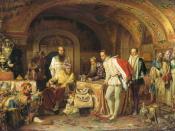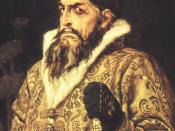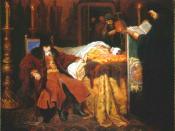Alexander Zubarev
Chapter 18 outline
The 1st sentence in the chapter is too basic. Russia's land empire was formed between 1480 and 1783, to be exact. Also, Poland continued to rival Russia until it got divided between three powers, Lithuania didn't. Instead, Russia and Poland competed for the influence of Lithuania, each demonstrating Orthodox and Catholic religions, respectively. Poland won the diplomatic battle, and pagan Lithuania became Catholic. However, Russia won the influence of Ukraine, and Ukraine became Orthodox. As a final result of these challenges, Lithuania was annexed and Poland divided--all by Catherine the Great. Anyway, I was correct in saying in Chapter 9 that the culture of Kievan Rus' was more boring than that of the Byzantine Empire. This is correct, but the latter is gone for more than 450 years now, while Russia stands to this day.
"Mongol control never reshaped basic Russian values, for the rulers were interested in tribute, not full government."
Correct. In Chapter 9 outline, I said that it is important not to place too much emphasis on Mongol rule in Russia, and this quote proves my point of view.
Ivan the Great liberated most of Russia from the Mongol rule, assumed control of ALL Orthodox churches, and was the 1st official czar (tsar) of the Russian people. He is worthy of being titled "Great". Unlike his successor, he also restored the economy (not by conquest), previously destroyed by the Mongols.
Ivan the Terrible is definitely worthy of the title "Terrible", although not by means that most people think of. The book talks about the negative aspects of the czar, but there were just as many (if not more), positive characteristics. True, in the 2nd part of his reign, he killed nobility, being the first version of Stalin. Just like Stalin, he was...


